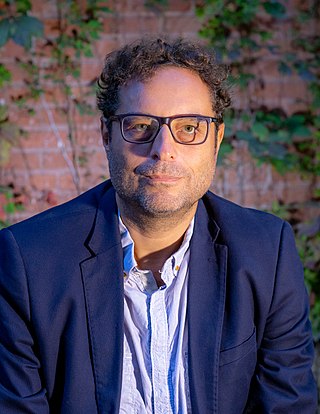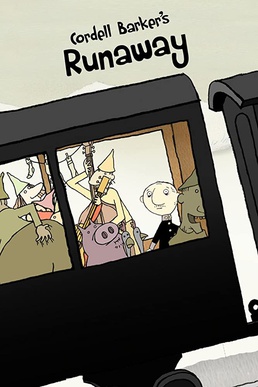Related Research Articles

The National Film Board of Canada is a Canadian public film and digital media producer and distributor. An agency of the Government of Canada, the NFB produces and distributes documentary films, animation, web documentaries, and alternative dramas. In total, the NFB has produced over 13,000 productions since its inception, which have won over 5,000 awards. The NFB reports to the Parliament of Canada through the Minister of Canadian Heritage. It has bilingual production programs and branches in English and French, including multicultural-related documentaries.

William Norman McLaren, LL. D. was a Scottish Canadian animator, director and producer known for his work for the National Film Board of Canada (NFB). He was a pioneer in a number of areas of animation and filmmaking, including hand-drawn animation, drawn-on-film animation, visual music, abstract film, pixilation and graphical sound. McLaren was also an artist and printmaker, and explored his interest in dance in his films.
The History of Canadian animation involves a considerable element of the realities of a country neighbouring the United States and both competitiveness and co-operation across the border.
Every Child is an animated short film produced in 1979 by the National Film Board of Canada in association with UNICEF.
The Canadian Screen Award for Best Animated Short is awarded by the Academy of Canadian Cinema and Television to the best Canadian animated short film. Formerly part of the Genie Awards, since 2012 it has been presented as part of the Canadian Screen Awards.
City of Gold is a 1957 Canadian documentary film by Colin Low and Wolf Koenig, chronicling Dawson City during the Klondike Gold Rush. It made innovative use of archival photos and camera movements to animate still images, while also combining narration and music to bring drama to the whole. Its innovative use of still photography in this manner has been cited by Ken Burns as the source of inspiration for his so-called Ken Burns effect, a type of panning and zooming effect used in video production to animate still images.

Kōji Yamamura is a Japanese independent animator who, after leaving a career as a background artist at an animation studio, directs, writes, edits, animates, creates the model sheets and background art for and sometimes produces his own short films and has worked on many commissions such as music videos, television advertisements, title sequences and station idents, both on his own and under or with other directors. He is also a regular illustrator of children's literature and textbooks.

Theodore Asenov Ushev is a Bulgarian animator, film director and screenwriter based in Montreal. He is best known for his work at the National Film Board of Canada, including the 2016 animated short Blind Vaysha, which was nominated for an Academy Award. He is a Chevalier of the Ordre des Arts et des Lettres of France.
When the Day Breaks is a Canadian animated short co-directed by Wendy Tilby and Amanda Forbis and featuring the voice of Canadian singer-songwriter Martha Wainwright singing the titular song.
Getting Started is a 1979 animated short by Richard Condie and produced in Winnipeg by the National Film Board of Canada.
Sleeping Betty is a Canadian animated short film by Claude Cloutier that humorously reinterprets the classic fairy tale Sleeping Beauty. Awards for the film include Best Animated Short at the 29th Genie Awards, the Audience Award at the Etiuda&Anima International Film Festival, the Audience Award and Judges Award at the Melbourne International Animation Festival, Best Animation at the Jutra Award, as well as the Public Prize and the Best Canadian Animation Award at the Ottawa International Animation Festival.
Drux Flux is a 2008 animated short by Theodore Ushev, inspired by Herbert Marcuse’s treatise One-Dimensional Man.
Falling in Love Again is a 2003 animated stereoscopic 3D film directed by Munro Ferguson, about a man and woman tossed aloft during a car accident, who fall in love while plummeting to the ground. Set to the song Falling in Love Again as sung by Marlene Dietrich, it was created by Ferguson at the National Film Board of Canada, using IMAX's SANDDE stereoscopic drawing system. It won a Canadian Genie Award for Best Animated Short in 2003. It was also included in the Animation Show of Shows.

Runaway is a 2009 short animated comedy film by Canadian animator Cordell Barker. It received a special jury award for short films at the Annecy International Animation Film Festival and was named the best animated short film at the 2010 Genie Awards. In 2010, the film won the Yorkton Film Festival Golden Sheaf Award for Best Animation.
The Hungry Squid is 2002 animated short film by John Weldon, about a young girl whose homework and personal life is being disrupted by creatures, including a giant ravenous squid. The film was animated using Weldon's personal style of do-it-yourself filmmaking, combining low-budget computer animation with puppets, photos and stop-motion animation in a technique he calls "digital recyclomation." The film's producer, Marcy Page, had coined the term "recyclomation" during production of Weldon's 1991 film, The Lump.
Christopher Hinton is a Canadian film animator, film director and professor, living in Victoria, British Columbia, Canada. Hinton's films have won international awards and been twice nominated for an Academy Award for Best Animated Short Film: in 1991 for the National Film Board of Canada (NFB) animated short film Blackfly and in 2003 for his independently made short Nibbles. Hinton won a Genie Award for his 2004 short film cNote. He began freelancing for the NFB in Winnipeg in the 1970s. He has written and directed over a dozen films for The National Film Board of Canada, CBC, & Sesame Street. Recent films, Flux (NFB,2003), cNote, Chroma Concerto (2007), and Compression (2008), explore the boundaries of narrative and abstraction and the integration of contemporary media into the moving image. He was a full-time professor in the Animation Program at Concordia University.

Lipsett Diaries is a 2010 short animated documentary film about the life and art of collage filmmaker Arthur Lipsett, animated and directed by Theodore Ushev and written by Chris Robinson. The 14-minute film was produced by the National Film Board of Canada in Montreal, where Lipsett had worked from 1958 to 1972, before committing suicide in 1986. The film is narrated by Xavier Dolan.

The Spine is a 2009 animated short film by Chris Landreth about a married dysfunctional couple, created in Landreth's "psycho realist" style, in which characters' mental states are reflected in their physical appearance. Voices for the couple were supplied by Gordon Pinsent and Alberta Watson.
Louise is a 2003 animated short by Anita Lebeau, produced by the National Film Board of Canada. The film takes audiences through a day in the life of Lebeau's 96-year-old Belgian-Canadian grandmother, Louise Marginet, who narrates the film. Set in the rural community of Bruxelles, Manitoba, Louise features traditional music played by family as well as the Bruxelles Brass Band.
Blackfly is a 1991 Canadian animated short from Christopher Hinton, produced by the National Film Board of Canada and based on "The Black Fly Song" by Wade Hemsworth. It was nominated for an Academy Award and Genie Award for Best Animated Short. The version of the song used in the film features back-up vocals from Kate & Anna McGarrigle.
References
- ↑ Black, Barbara (23 March 2006). "Abstract art-and-music pas de deux wins a Genie". Concordia Journal. Vol. 1, no. 10. Retrieved 22 October 2010.
- ↑ "cNote". Collection page. National Film Board of Canada . Retrieved 31 March 2011.
- ↑ Glassman, Marc. "Music is the Food of Life". Focus on animation. National Film Board of Canada. Archived from the original on 2011-09-25. Retrieved 31 March 2011.